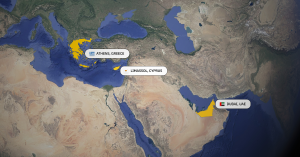What is the future of work? As traditional concepts that served as a basis for our understanding of how our professional development should go (some 12 months of behind-the-desk work, occasionally interrupted by short vacation trips) have evolved, we have seen the rise of a new trend in the face of millions of people who choose to travel constantly, while working remotely. Digital nomadism, one of the trendiest working lifestyles, is projected to push over 1 billion people to combine exploring new cultures with performing their work tasks, according to the MBO Partners’ 2020 State of Independence research study. The shift to this new normal has already started, with some 74% of the employees expressing a desire to transform their working lifestyle. Statistically speaking, digital nomads are 13% more productive, compared to their office-working colleagues, with some 70% of them visiting at least 5 countries every year, Stanford Business and And.co report. In the Balkans, Romania has been ranked among the top three digital nomad destinations by the Digital Nomad Index report. So, what are the regional trends and how can we transition to a well-balanced digital nomad lifestyle?
With the goal of answering these questions, growRemotes, a community invested in popularizing the benefits of the digital nomad movement, is organizing for the first time the growRemotes Summit, taking place on April 22 and 23, 2021. To get more insights about the digital nomad trends and growRemotes’ plans for nurturing the digital nomad community, the Recursive team met with Milena Hadzhiivanova, founder of the growRemotes community in Bulgaria and organizer of the growRemotes Summit. Here is our interview!
The Recursive: What are the trends that shape the digital nomad movement in the region and how can a digital nomad diaspora contribute to transitioning to combining remote work and traveling?
Milena Hadzhiivanova: Digital nomads as a group have a specific culture and mindset. The key factors when it comes to incentivizing digital nomads to travel to a particular location are the country’s behavior, culture, and policies. One of the important criteria for determining the countries suitable for digital nomads is the Happiness Index. When we look at the difference between Romania and Bulgaria’s ranking (as of 2020, Bulgaria is 96th, while Romania is 47th), we can surely say that Bulgarians are behind when it comes to achieving happiness and this is also reflected in the Digital Nomad Index.
The country for long has had individual digital nomads, it’s not new for Bulgaria. I can give an example with myself when I work from a mountain hut or camping throughout the summer or traveling to lovely spots – I am a digital nomad of sorts. Many people choose to travel and work like that, so it is our mission not only to popularize the digital nomad movement but to also gather the people who are already here in a close-knit community where they can exchange views and ideas, share information or stories, help each other and stay connected. Of, course, being a digital nomad may look romantic at first look, but there are many obstacles and such a community can contribute a lot through discussions about how to deal with problems, associated with transitioning to the digital nomad lifestyle. Being a digital nomad may look romantic at first, but there are many obstacles and such a community can contribute a lot through discussions about how to deal with problems, associated with transitioning to the digital nomad lifestyle.
What are the biggest challenges digital nomads face?
To better understand this, we are still gathering information from our survey. For one, people who are transitioning to the digital nomad lifestyle and have families find it more challenging to adjust and find the right balance between this new work mode and their close ones. When you have children and a partner, in the common case, you cannot afford to leave them for a month.
Another factor that can be troublesome is, of course, the internet connectivity in the respective country. Having led training from different points of the world, I can say that, no matter how unique the place is, if the Internet connection is unstable, then it turns into a serious problem as it can affect your business. The idea behind the digital nomad lifestyle is to keep things balanced – to take care of yourself, travel, experience new cultures, while conducting your business and even enriching it.
What is unique about the growRemotes Summit and how can the event contribute to different interested parties?
The event is first-of-its-type in Bulgaria. We have been engaged in organizing it for over 9 months now, a process that included a lot of research, networking, and participating in international forums. We aim to create a community platform that will function as a channel for connecting digital nomads. Thanks to the event, we are all over social media, thus creating a channel through which we enable people to join and communicate with each other.
The conference is aimed at three sedges or corridors: for one, to help corporates adjust to the new remote work trend. In this direction, the event will offer strategies for building a new corporate culture, adding new elements to the working process, and discovering new ways of keeping their employees engaged. From the corporate perspective, becoming a first mover in reacting to the digital nomad trend means that they will be able to attract some adventurous, talented cadres and make them feel well-fitted into the company, thus increasing their productivity. Secondly, we want to elaborate on the topic of how Bulgaria can become a more attractive destination for digital nomads from the whole world and how the country can adopt a conscious and goal-oriented set of policies for doing this. Most importantly, we would like to help the digital nomads during their transition, which is often connected to developing an entirely new mindset. We want to help them with identifying what is specific for the digital nomad environment and how they can work to improve and upgrade themselves, no matter whether they are freelancers, part of the corporate world, or entrepreneurs.
What are the biggest challenges you have faced so far and what are the future plans of growRemotes?
One of the biggest challenges we’ve faced is finding sponsors – although many companies expressed interest to embrace the initiative, only two companies signed in to officially sponsor us. The other main obstacle is in persuading the audience, which is so overwhelmed with online events, that we can offer them a different kind of event and experience. Simply accepting the social media invitation to the conference is no guarantee that people will join. Many are nostalgic about the live events that we had before the pandemic, yet this is also a source of opportunities. In our case, we managed to attract many speakers who would otherwise not be able to participate in the event. For now, we have about 400 registered attendees, and our goal is to popularize the Summit as much as we can.
Of course, we are to continue with the initiative. Our future plans include a list of follow-up activities and one more event, possibly in November or December. Until then, we will invest ourselves in expanding our community and telling real stories of digital nomads from the region. Our Work from anywhere survey has a crucial role in the process. As of now, we intend to keep it open to gather more information about digital nomads that are part of the Bulgarian ecosystem. This is especially important as it will give us a better understanding of what the challenges and opportunities, associated with digital nomads, are typical for our region.








